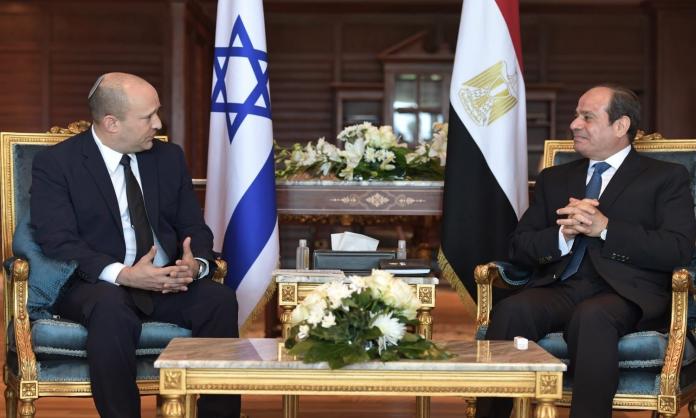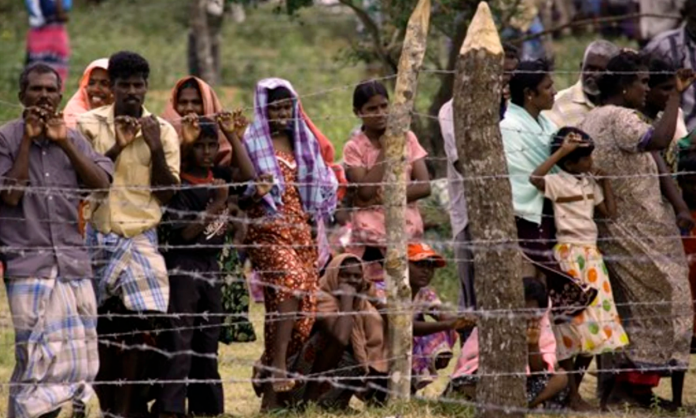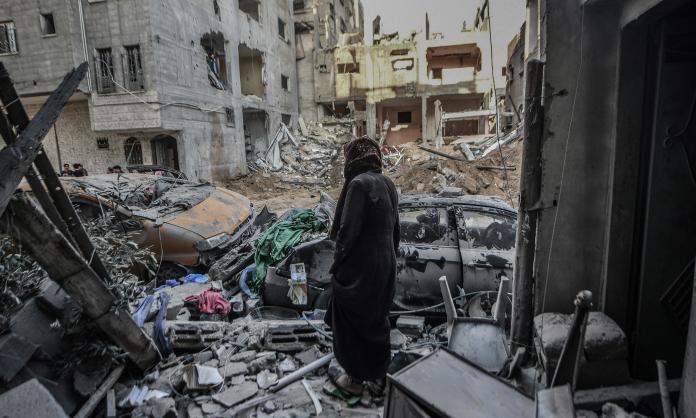The Palestinians have many enemies. One requires special damnation for its role in the current genocide—the monstrous counter-revolutionary Egyptian military dictatorship of Abdel Fattah el-Sisi.
Of all the Arab regimes, Egypt, which shares a border with Gaza, could most directly come to the aid of the Palestinians and challenge Israel. But it doesn’t lift a finger.
The reasons for this are known to the millions of Egyptians struggling to survive under tyranny: Egypt is the second largest recipient of military aid in the Middle East, second only to Israel. US dollars fund not only the genocidal military machine slaughtering Palestinians, but the dictatorship that represses Egyptians.
The priorities of the Egyptian military are self-enrichment, cementing their dictatorial power across every institution of Egyptian capitalism and crushing the Egyptian population through violence and poverty. They are supported by the Arab gulf monarchies—Qatar, the United Arab Emirates and Saudi Arabia—like-minded regimes determined to prevent the region’s working classes from repeating the mass revolts and revolutionary uprisings that shook governments to the core between 2011 and 2019.
From Tunisia, Egypt, Bahrain and Syria in 2011, to the uprisings in Lebanon, Iraq, Algeria and Sudan in 2019, every regional revolutionary struggle raised the Palestinian flag, and the demand for Palestinian liberation.
In Egypt, the second Palestinian intifada (2000-05) ignited and inspired a decade of resistance to the country’s authoritarian regime. This led to a re-consolidation of the left and the growing militancy of powerful sections of the Egyptian working class, which in turn erupted into the revolution of 2011 that overthrew Hosni Mubarak and his corrupt ruling party.
The Palestinian cause is a lightning rod for resistance in Egypt because it embodies the struggle against the capitalist forces that repress both the Arab working classes and the Palestinians—the regional ruling classes in partnership with Israel and US imperialism.
Sisi and his military know it, which is why their counter-revolutionary repression of Egyptians—economically, politically and socially—has been so comprehensive. Indeed it is worse than under Mubarak’s dictatorship.
Egyptians endure a level of destitution not seen since the historic bread riots of 1977. Inflation is officially 40 percent, although on the streets people report up to 100 percent inflation on some essential items. In 2020, the poverty rate had jumped to 32 percent in a population of 105 million. Sixty percent of Egyptians hold ration cards, needed for buying subsidised essential goods, including food staples. Real wages have declined, and the youth unemployment rate stands at 17 percent (50 percent of the population is under the age of 25).
Against this backdrop of deprivation, the Egyptian military’s top brass has been living large while reducing social spending and subsidies for workers and the poor. Military elites have spent billions in the past decade on mega-projects that are little more than multi-billion-dollar profiteering ventures for the generals, who own an ever-increasing share of Egyptian industry.
Languishing in Egyptian jails are 60,000 political prisoners—mostly Muslim Brotherhood members, but also leftists—who have been rounded up, tortured and imprisoned since the 2013 military coup that deposed the democratically elected but increasingly unpopular Muslim Brotherhood government.
Sisi has exacted a brutal revenge on the millions of Egyptian workers and students who rose up in 2011 demanding “bread, freedom and social justice”. The military has eliminated the small democratic spaces that existed under Mubarak, spaces that allowed some, albeit limited, organising—be it in solidarity with Palestinians, or industrial campaigns in state-owned industries. Student unions are banned, public protests are banned, the military has shut down NGOs and human rights organisations. There are no independent trade unions and independent media is virtually non-existent.
The military has embedded itself in all layers of the capitalist state, purging it of opposition figures and factions. The judiciary is essentially a military court and there are no mass or smaller civilian political parties with representation in parliament. Even the mosques have been raided and purged of preachers aligned with the Muslim Brotherhood or sympathetic to the 2011 revolution. The regime even demands oversight of scripts for Friday prayers at the central Al-Azhar Mosque in Cairo—a place known as a rallying point for solidarity with the Palestinian struggle.
In spite of the outlawing of dissent, when Israel began its war on Gaza, Egyptians began to raise their voices in anger. Small protests broke out. Sisi knew what was coming, and when criticisms of him started to mount, albeit in muted tones, he tried to co-opt and circumvent mass rage at Israel and frustration that the Egyptian regime was doing nothing to defend the Palestinians.
Sisi called a state-sanctioned protest on 20 October, releasing a list of locations at which legal demonstrations could take place. The places—such as in stadiums and mosques—were chosen to stop people massing in the streets.
However, in both Cairo and Alexandria, some protesters defied the official list, including students who walked off university campuses, filling the streets and heading to Tahrir Square, the iconic centre of protest in the 2011 revolutionary uprising. They chanted “The people want the downfall of Israel!” Some also chanted against Sisi’s regime.
Thousands marched through downtown Cairo but were stopped by the armed forces when they arrived at Tahrir and tried to break through security barriers. Hundreds were beaten. More than 100 were arrested in Cairo and Alexandria. Since then, only a handful of small, but nonetheless significant, protests have been held, such as those called by the Journalists Syndicate outside their office in downtown Cairo.
The Journalists Syndicate, alongside BDS Egypt, has bravely continued solidarity actions. They called for a Global Conscience Convoy to travel to the border with Gaza, shortly after Israel began its war on the territory, and to demand entry for aid trucks. Activists and medical professionals from across the world converged on Cairo to be part of the convoy and to show solidarity with Palestinians. So far, the government has not issued the permits required for any convoys to leave Cairo.
Instead, the regime is collaborating with Israel. Since the 2013 coup, more than 50,000 Egyptians have been forcibly evicted from their homes in Rafah, many of them Palestinian Bedouins. Thousands of residential homes and administrative buildings have been demolished and thousands forced out of their historical homelands under the pretext of Egypt fighting ISIS and other Islamic militants in the northern Sinai.
The principal reason, however, is Egypt’s collaboration with the US and Israel’s plan to create a “buffer zone” on the Egyptian side of Gaza. The regime has destroyed vast tunnel complexes that once stretched from Egypt into Gaza, providing a lifeline through which food and building materials were transported into the territory to mitigate the strangling effects of Israel’s illegal siege and blockade.
While Sisi struts the stage at pan-Arab summits, crowing about his regime’s undying support for the Palestinians, he has submitted to Israeli demands that the drops of aid allowed through the Egyptian border into Gaza must pass through an Israeli checkpoint first. Unbeknownst to many, when aid travels through the Rafah crossing, it must divert almost 80 kilometres on a round trip to an Israeli checkpoint at Al-Awja/Nitzana, where the Israeli military holds up essential supplies and has the final say on what aid, if any, may enter Gaza through the Egyptian border.
Egypt signed a peace treaty with Israel in 1979—the first Arab state to officially recognise the apartheid regime. Since then, the Palestinians have had no peace and successive Arab states have “normalised” relations with Israel. The only way in which these relationships can be viewed as “normal” is when they are understood from the perspectives of the ruling classes of Israel, the Arab regimes and the US.
For them, “normal” is the exploitation and oppression of their own working classes. For them, “normal” is collaboration between their own despotic states in the service of power and profits for their ruling elites.
Sisi says that he will never support the transfer of Palestinians into northern Sinai. The Palestinians should never be forcibly transferred anywhere. But Sisi doesn’t care about the Palestinians. His regime could and should be doing whatever is needed at the Gaza border to defend and protect the Palestinians. He won’t do it.
There is a power that could—the restive and momentous power of the Egyptian working class, alongside the other working classes of the region. Together, their shared exploitation and oppression at the hands of all the regional powers, the US and the West could be overturned and all of the Sisi’s of the region crushed. Then, the permanent liberation of Palestine could be realised.








